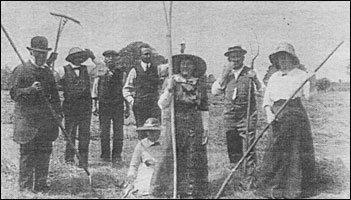![]()
The contents on this page remain on our website for informational purposes only.
Content on this page will not be reviewed or updated.
 |
|
 |
|
|
||
|
Milton Keynes Village: Belgian Refugees, WWI
|
||
|
||
|
Milton Keynes Citizen, April 19, 2012 Across the country, at the beginning of World War One Belgian refugees were given refuge in English villages, typical of which was Milton Keynes At the beginning of the First World War, when Belgium refused to allow the German armies to cross their territory the population suffered a terrible consequence. But it was the bravery of the Belgian army that initially stalled the enemy advance and so prevented the capture of Paris and thus the fall of France. German reprisals against the Belgians were characteristically brutal but for those who could escape Britain provided a ready refuge, not least in appreciation for the heroic stand of 'Brave little Belgium.'All over the country, in towns and villages, accommodation was being made ready and at the village of Milton Keynes it was Mrs Harley, of Walton Hall, the Reverend G Hawkes Field, rector of Milton Keynes, and Mrs Field who were the prime movers in securing comfortable homes for two Belgian refugee families. Mr Alan Finch - affectionately regarded by the villagers as 'the squire' - provided two thatched cottages rent free near the village centre, situated in a meadow off the main street, and with furniture etc. provided, it would be one Monday night in October 1914 that the refugees arrived. Before the war they had earned their livelihood working small plots of land at Buggenhout, a village a few miles from Antwerp, and when Mrs Harley and the others had approached the Belgian Refugee Committee they had made clear they needed people who would be of use on farms in the district. One of those duly forwarded was Frans Van Eyken, a middle aged labourer, who in Belgium had kept two cows, some pigs and poultry. His wife Rosalie, and 18-year-old daughter, Philomena, would also help for, "They can milk the cows and do all kinds of work on the land." Until 12 months ago their son, August Van Eyken, had helped on the smallholding but more recently he had turned his attention to coal mining. As for another son, he was in the army fighting the Germans. Fortunately the family received good warning of the enemy advance and managed to flee but sadly on the afternoon of Wednesday, October 28,1914, Madame Van Eyken passed away from acute erysipelas. Since arriving in the village she had complained of acute pains in the head and was attended by Dr Holmes of Woburn Sands, and Dr Bailey of Newport Pagnell. The other Belgian family was that of 32-year-old Madame Mathilde Rosa Segers, with her aged mother and six small children. In their urgent flight her father was lost and his whereabouts unknown and when the Germans discovered that her husband was a Belgian soldier they set light to the cottage, and destroyed all the pigs and chickens. In fact Madame Segers had many tales of German atrocities, against men, women and children, and with no love for the species the refugee families had prominently placed the Belgian flag on the front of the cottages which, prior to the arrival of the families, had been painted by the men of the parish, with the interiors papered and the floors scrubbed and the windows cleaned by the women, who also brought food. As for those foreigners who were resident in Britain, as 'aliens' those who were not interned were subject to various restrictions and within this category was a Dutchman. He had been in the country for a while but by 1918 still seemed confused by the requirements, for he was summoned for not giving notice of his arrival at the village of Broughton and for having failed to notify his departure. Police Constable Bunce said he had seen the man on the Newport Pagnell road at Broughton under the influence of drink and when questioned the man said he lived at Newport Pagnell but was staying at Broughton as he had come to see his wife. Thinking it unnecessary to register as a Neutral - "and a friendly one at that" - he pleaded ignorance and said he hadn't read the last instructions pasted on the back of his identity book. A fine was imposed and when the chairman told him he was careless not to read the instructions he replied, "I have read them since." |
||
|
|
||
|
|
||

